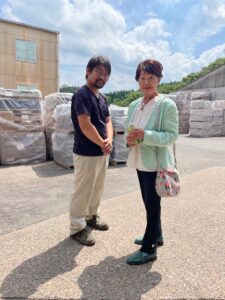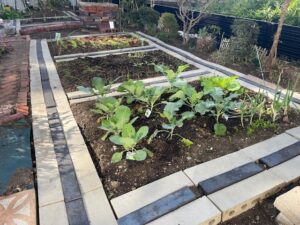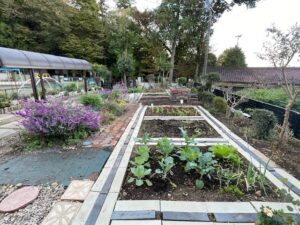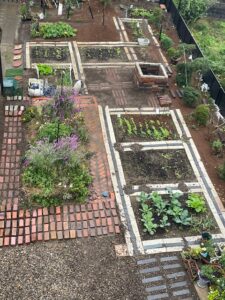









— Kunishiro Taika Kogyo × Suwa Kindergarten —
A simple chance encounter in Tokyo’s Azabu-Juban quietly sparked a story no one expected.
From that moment, this project began.
One early summer day, we visited the showroom of Kunishiro Taika Kogyo.
While speaking with their representative, I happened to ask:
“We are gradually improving the garden at our kindergarten.
We’re hoping to create brick pathways and small towers for the children.
Would you happen to have suitable materials?”
Often, a story begins with just one small question.
And this single question opened the door to a future yet to be written.
After a brief pause, the representative smiled gently and replied:
“If you like, why not try using these bricks?
They were produced in our Tajimi factory here in Gifu and were used for a high-rise building in Osaka.
Some remain unused, and it would be a shame to discard them.”
It was a proposal we had never imagined.
Bricks born in Gifu, supporting the cityscape of Osaka,
and now returning to Gifu to take on a new life at a kindergarten.
Their journey itself felt like a story of “renewal.”
Under the warm early-summer sun, we visited the factory in Tajimi.
Craftsmen worked silently in front of the furnace as clay was transformed into brick through intense heat—
a living expression of craftsmanship at its very origin.
Feeling the warmth embedded in each brick, I thought:
“These bricks may one day support the future paths of our children.”
Kunishiro Taika Kogyo
Brand Story – Craftsmanship Nurtured in Mino
https://www.agorabrix.co.jp/brandstory
Then came autumn—the day of delivery.
The factory manager from Kunishiro Taika Kogyo greeted us with a gentle smile:
“We are delighted that the children are happy.
It feels as if our bricks are happy, too.”
These high-quality bricks are the same type used in public facilities across Gifu Prefecture.Their deep navy, reddish-brown, black, and gray tones blend sophistication with a natural harmony,
surprisingly well-suited to the surrounding landscape of Gifu.
In the kindergarten garden now surrounded by these bricks,
our Food & Agriculture Project is underway using organic farming methods.
With guidance from Veggie Hills, an organic farm in Hokkaido,
the children have grown crops such as watermelon and tomatoes,
and they are now planting the strawberry variety “Strawberry Sweet.”
“Many living things dwell in the soil.”
“Good vegetables can only grow from good soil.”
—such messages arrive from the northern fields of Hokkaido through online sessions.
The children are not only growing vegetables;
they are learning the meaning behind growing them.
Veggie Hills
https://www.veggiehills.com
Waiting for seeds to sprout, worrying on rainy days, rejoicing when fruit appears—each moment becomes a lesson in the “cycle of life.”
Craftsmen in Tajimi, organic farmers in Hokkaido,and the children of Suwa Kindergarten—hands far apart yet connected in a shared story of renewal and growth.
From Tokyo to Osaka, from Gifu to the north of Japan,this project weaves together distant places and people.
Bricks that once supported a city skyscraper now support the future of children.
The soil and the bricks teach us:
both life and materials can be reborn—again and again.
We extend our heartfelt appreciation to everyone who made this small story possible.
Tokyo, Osaka, Hokkaido, Tajimi, and Gifu—
places far apart, yet connected through helping hands and a shared hope for “renewal.”
Our sincere thanks go to Kunishoro Taika Kogyo for graciously providing the bricks,and to Veggie Hills,for continuously teaching our children about the “cycle of life” through food and agriculture.
And at the very beginning was a quiet moment near Patio Square in Azabu-Juban—a small stage of “serendipity,”where an unexpected yet fortunate encounter occurred.
Gifu and Tajimi are in the same prefecture,
yet without this Tokyo crossroads, these paths may never have met.
That serendipity has now brought people and materials together once again,
giving birth to a small but meaningful story of renewal.
We hope this story continues to gently breathe life into the future of our children.
— End —
We are pleased to announce that Suwa Kindergarten has received a generous donation of bricks from the company of Konishiro Taika Kogyo We would like to express our deepest gratitude for their support.
The bricks provided were originally manufactured in Tajimi, Gifu, and later used in the construction of a high-rise building in Osaka. They are high-quality materials proudly made in our region.
These bricks will be repurposed for the improvement of our kindergarten grounds, including pathways in our educational garden.
Born in Gifu, supporting the growth of Osaka’s cityscape, and now returning to Gifu to support the future of our children—
the “second life” of these bricks offers a meaningful lesson in the cycle of resources and the continuity of life.
理事長ブログ
🌱 ① 出会いの始まり
― 国代耐火工業所 × 諏訪幼稚園 ―
東京・麻布十番の小さな出会いから、思いがけない物語が生まれました。
その出会いをきっかけに、このプロジェクトが始まりました。
初夏のある日、国代耐火工業所様のショールームを訪ねました。
営業担当の方とお話をしながら、ふとこう尋ねました。
「幼稚園の畑を少しずつ改良しています。
子どもたちが通るレンガの小道や塔を作りたいのですが、何か良い素材はありますか?」
出会いは、いつも小さな一言から。
この一言が、未来へと続く物語の始まりでした。

🧱 ② “再生”という提案
国代さんは少し考え、柔らかな笑みを浮かべながら答えました。
「それなら、よければこのレンガを使ってみませんか?
大阪の高層ビル建設で使われたレンガが少し余っていて、
廃棄するのはもったいないんです。工場は多治見で岐阜ですから。」
思いがけない提案に、心が動きました。
岐阜で生まれたレンガが、大阪で街を支え、
そしてまた岐阜の幼稚園で新しい命を得る。
その旅路そのものが「再生」の物語のようでした。
🔥 ③ 多治見の工場で見たものづくり
初夏の陽ざしの中、私たちは多治見の工場を訪れました。
炉の前で黙々と働く職人の方々。
高温の中で土が焼かれ、レンガが形を成していく光景は、まさに“ものづくり”の原点でした。
一枚一枚のレンガに込められた手のぬくもり。
その温かさに触れながら思いました。
「このレンガが、子どもたちの未来を支える道になるかもしれない」
国代耐火工業所様
ブランドストーリー・美濃で育まれた技術
https://www.agorabrix.co.jp/brandstory


工場長と園長
🚚 ④ レンガが幼稚園へ
そして秋。引き渡しの日。
国代耐火工業所の工場長さんが穏やかな笑顔で話してくださいました。
「子どもたちが喜んでくれて、うちのレンガも喜んでいます。」
このレンガは、県内の公共施設の外壁にも使われている高品質なレンガです。
紺、赤茶、黒、灰色が交ざり合い、
都会的で洗練された印象を与えながらも、
岐阜の自然の中に不思議なほど溶け込んでいきます。

🍓 ⑤ 子どもたちと食農プロジェクト
今、そのレンガに囲まれた園の畑では、
有機農法による「食農プロジェクト」が進んでいます。
北海道の有機農家・ベジヒルズさんのアドバイスを受けながら、
これまでにスイカやトマトを、
そして今はイチゴ「ストロベリースイート」の苗を植えています。
「土の中にはたくさんの生きものがいるんだよ」
「いい野菜は、いい土からしか生まれないんだ」
——そんな言葉が、遠く北の大地からオンラインで届きます。
子どもたちは、ただ野菜を“育てる”のではなく、
“育てる意味”を体験しています。
べジヒルズ様
https://www.veggiehills.com

🌸 ⑥ 命の循環と未来へ
芽が出る日を待ち、雨の日には心配し、実がついたときに喜ぶ。
そのすべてが「命の循環」を学ぶ時間です。
多治見の職人さん、北海道の有機農家さん、そして諏訪幼稚園の子どもたち。
東京、大阪、岐阜——遠く離れた手と手がつながり、
「再生」と「成長」の物語が紡がれています。
都会のビルを支えたレンガが、今は子どもたちの未来を支えている。
土とレンガが教えてくれるのは、命も素材も、何度でも生まれ変われるということ。

🌸 結びのメッセージ(お礼)
この小さな物語を支えてくださった皆さまに、心から感謝を申し上げます。
東京、大阪、北海道、多治見、そして岐阜——。
遠く離れた場所の手と手がつながり、「再生」というひとつの希望の形になりました。レンガをご提供くださった 国代耐火工業所様。そして、いつも食農の学びを通して子どもたちに「命の循環」を教えてくださっている ベジヒルズ様。皆様の温かなご協力が、このプロジェクトを現実のものにしてくださいました。
そして、すべてのはじまりは——東京・麻布十番のパティオ広場の近く。小さな「偶然劇場」のそばで生まれた、ひとつのセレンディピティ(思いがけない幸運な出会い)。岐阜と多治見、同じ県の中で生まれた絆。けれど、もし東京という“結節点”がなければ出会わなかった不思議。そのセレンディピティが、時を超えて、人と素材をもう一度つなぎました。
こうして、ひとつの小さな「再生の物語」が生まれました。この出会いが、子どもたちの未来へと静かに息づいていくことを願っています。

ーおわりー